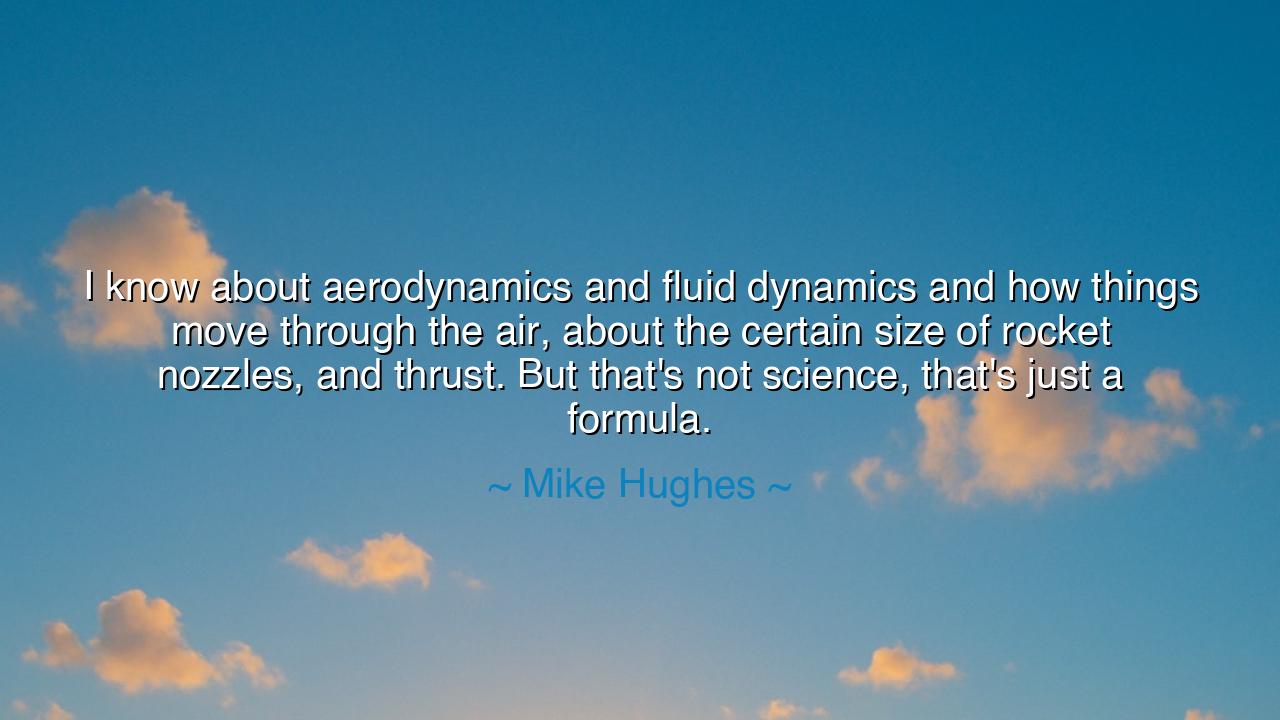
I know about aerodynamics and fluid dynamics and how things move
I know about aerodynamics and fluid dynamics and how things move through the air, about the certain size of rocket nozzles, and thrust. But that's not science, that's just a formula.






"I know about aerodynamics and fluid dynamics and how things move through the air, about the certain size of rocket nozzles, and thrust. But that's not science, that's just a formula." These words, spoken by Mike Hughes, resonate with a profound truth about the nature of knowledge and discovery. Hughes reflects on the technicalities of aerodynamics, fluid dynamics, and rocket science—fields that are often reduced to mere formulas and equations. Yet, he reminds us that the true essence of science is not merely the application of formulas, but the deeper understanding of the principles that govern the world around us, and the spirit of exploration that drives us to push the boundaries of what is possible.
In the ancient world, great minds like Archimedes and Pythagoras sought to understand the laws of nature through the lens of mathematics and geometry. Their discoveries, like the concept of buoyancy and the relationship between the sides of a right triangle, were based on careful observation and reason. However, these great thinkers were not just concerned with formulas; they were driven by a deep desire to understand the very nature of reality. Archimedes, for instance, did not simply want to know how to measure the volume of an object, but he sought to understand why the world operated the way it did. Science, as the ancients knew, was not just about memorizing formulas but about seeking the truth behind those formulas—about understanding the forces that shape the universe.
Consider the story of Isaac Newton, whose work in physics revolutionized our understanding of the universe. Newton’s laws of motion and the law of universal gravitation were not just abstract formulas; they were insights into the fundamental principles that govern everything from the falling of an apple to the movement of the planets. Yet, what set Newton apart was his ability to look beyond the equations themselves, to see the universal truths that the equations described. For him, science was not merely the manipulation of numbers; it was the pursuit of a deeper understanding of how the world worked. This is what Hughes alludes to when he says that aerodynamics and rocket science are not science in their purest form—they are tools that point toward something greater.
In Hughes's words, there lies a subtle reminder of the difference between the application of knowledge and the pursuit of understanding. Science, in its deepest sense, is not simply the manipulation of formulas and numbers, but the search for the underlying truths that guide those numbers. It is the spirit of curiosity, the willingness to question, explore, and learn, that drives us to seek answers not just to practical problems, but to the very mysteries of existence. Just as Newton looked to the heavens not only to calculate the orbits of the planets but to understand the fundamental forces of nature, so too must we approach the world with an eye for the deeper truths that lie beyond the formulas.
Hughes's words also point to the importance of creativity in science. The formulas and equations that govern the movement of rockets, planes, and other objects through the air are the result of rigorous thinking and experimenting, but it is the creative mind that dreams up the ways to apply these formulas to new, bold ventures. The very idea of space exploration, of reaching beyond the Earth and breaking free from gravity’s grasp, was once a fantasy—a dream far beyond the reach of the most advanced scientific minds. Yet, it was the combination of creativity and knowledge, of imagination and science, that brought us to the moon. Hughes himself, in his pursuit of launching a homemade rocket to prove his theories, embodied this spirit of innovation, seeking to push the boundaries of what was possible, even in the face of uncertainty and skepticism.
The lesson we can draw from Hughes’s reflection is one of balance—the understanding that science is not just the mastery of technical formulas, but the pursuit of deeper wisdom. Knowledge is a tool—a means to an end—but it is the spirit of inquiry, the curiosity, and the imagination that drive true discovery. Whether we are seeking to understand the forces that govern the natural world, explore new realms of technology, or unlock the mysteries of the universe, we must remember that science is not merely about calculation; it is about seeing the world with fresh eyes, about challenging what we know and striving to understand the underlying forces at work.
In our own lives, we must take this lesson to heart. Whether in our studies, our careers, or our personal endeavors, we must not be content to simply learn the formulas—we must seek the understanding behind them. Just as Hughes challenged the boundaries of rocket science, so too must we challenge the boundaries of our own knowledge. The pursuit of truth is not about memorizing facts or solving equations; it is about engaging with the world with curiosity, imagination, and a willingness to explore what lies beyond the obvious. Only then will we uncover the deeper truths that lie beneath the surface, and truly understand the world in all its complexity and wonder.






AAdministratorAdministrator
Welcome, honored guests. Please leave a comment, we will respond soon